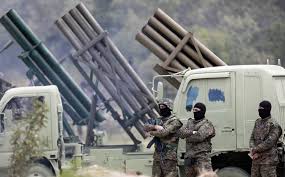Understanding Hezbollah’s Role in Current Middle East Dynamics

Introduction
Hezbollah, a Lebanese militant group and political party, has been a significant player in the Middle East, especially in the context of rising tensions in the region. With its origins in the early 1980s, the group’s influence has not only persisted but has grown, impacting both local and global politics. Recent events concerning Hezbollah have drawn international attention, raising concerns about stability in the Middle East and the implications for international relations.
Recent Developments
In October 2023, Hezbollah was involved in a series of cross-border skirmishes with Israeli forces along the Lebanese-Israeli border, escalating a longstanding conflict that has seen numerous flare-ups in recent years. Tensions were heightened following Hezbollah’s announcement of a military alliance with Palestinian groups in response to rising violence in the Gaza Strip, reflecting the group’s ongoing commitment to armed resistance. In a press conference, Hezbollah’s leader, Hassan Nasrallah, stated that these actions are a direct response to perceived Israeli aggression, urging solidarity among Arab nations.
Hezbollah’s Influence
Hezbollah’s impact extends beyond military confrontations; its social and political roles in Lebanon are substantial. The group operates extensive social services, including healthcare and education, which have endeared it to many Lebanese citizens. This support has strengthened its political position, as seen in the 2022 Lebanese parliamentary elections, where it secured a significant number of seats despite a challenging economic backdrop in the country. Its dual role as a military force and a socio-political entity complicates the governance landscape in Lebanon, making diplomatic solutions more elusive.
International Reactions
Hezbollah’s actions have prompted varied responses from international actors. The United States and several European nations label Hezbollah as a terrorist organisation, arguing that its military activities threaten regional security and stability. Conversely, some countries in the Middle East view Hezbollah as a legitimate resistance group defending against Israeli actions. The divided opinions on Hezbollah’s role highlight the complexities of Middle Eastern geopolitics, where alliances may shift rapidly based on unfolding events.
Conclusion
The stability of the Middle East hinges on understanding groups like Hezbollah, which play crucial roles in both military and political realms. As tensions continue to rise, monitoring the actions and influence of Hezbollah will be essential in forecasting future developments in the region. The intricate web of alliances and hostilities suggests that the situation will remain fluid, requiring keen observation from international stakeholders and policymakers. For readers, staying informed on Hezbollah’s evolving strategies and their regional implications is vital for understanding broader Middle Eastern dynamics.
